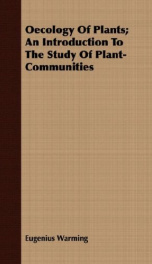oecology of plants an introduction to the study of plant communities

OECOLOGY OF PLANTS AN INTRODUCTION TO THE STUDY OF PLANT -- NOTE - IT is now some years since expectation became prevalent of an English edition of Professor Warmings book-Plantesamfugzd. Nothing need now be said about the difficulties opposing its pro- duction, because Professor Warming has solved them happily by writing for the Delegates of the Oxford Press this present book, founded upon his original Danish work. To the manuscript, as it has been prepared by and received from Professor Warming at intervals, Professor Groom has applied with untiring patience his skill in interpretation and in apt expression, and the book as it now appears is therefore not an English edition of a foreign book-as are others of the botanical series issued by the Dele- gates of the Oxford Press, but is practically a new work , as the author himself designates it. q The book is a valuable addition to botanical literature, and will appeal to a wide audience. Its subject, Oecology, is the field in which the botanical morphologist, physiologist, and systema- tist happily meet, and to them this statement of the views of a pioneer and leader in oecological work will be welcome. Those whose interests lie in the practical application of a knowledge of plant life in the several domains of rural economy-Agriculture, Horticulture, Forestry-will find in the matters treated in the book the clue to many of the problems which they meet with. Teachers within whose sphere it lies to encourage a study of Nature will find its pages full of information. and suggestion to guide them. Students of Botany will glean from it sound instruc- tion in a subject which now occupies a prominent place in botanical teaching. Every one, indeed, for whom the varying aspects of vegetation have interest will obtain by perusal of the book new lights by which that interest may be increased. Perhaps in no way will the value of the book be greater than as L t i 111 111 U to acclirate observation and inquiry, t irougll -hicll Ocrolog- -ill be advanced fro111 tlre stage of infancy . in I-llicll. it- 11-oft.or ITarlnilg says, it non- is. 111th c11aractc.r of the book and the llethod of its p-odiction Iai-tb rlcce-yaril. placcd a restriction upon editorial frunctions, ancl Ila1.e not allo-ecl of modifications that nnigllt have brought 11101-tA tlircctlv home home of its teaclrings to readers in Hritain- 101- in-tanccb. bi- tlrr int1-otlllction of a RI-cater nrumbcr of illu-t I-a- tiw I-cafer-cncei to 1-cgctation in tlcl Britislr 1.1-. If, a- .e bclici-c. it.iI1 be tlle taw, 1 rlei- edition of the book i callec tor-. atttitiorr nlu- be given in it to matters of tllib liii. AUTHORS PREFACE - IN 1895 I published a Danish work entitled Plantesamfzcnd, which was based upon lectures that I had delivered in the University of Copenhagen. I never imagined that the book would appeal to more than a few readers outside my audience, and was therefore greatly surprised shortly after its publication to receive from Dr. E. Knoblauch a request for permission to prepare a German version of my book-an act of courtesy, since Denmark had not subscribed to the Bern Convention, and my book was thus public property. Thanks to Dr. Knob- lauchs energy the German edition was published in 1896. In the short time available I found it impossible to introduce more than trifling changes into his edition, and was forced to post- pone the more important modifications that I contemplated...
Info about the book
Author:
Series:
Unknown
ISBN:
1441968121
Rating:
3/5 (1)Your rating:
0/5
Languge:
English
Users who have this book
Users who want this book
What readers are saying
What do you think? Write your own comment on this book!
write a commentif you like oecology of plants an introduction to the study of plant communities try:
Do you want to read a book that interests you? It’s EASY!
Create an account and send a request for reading to other users on the Webpage of the book!


